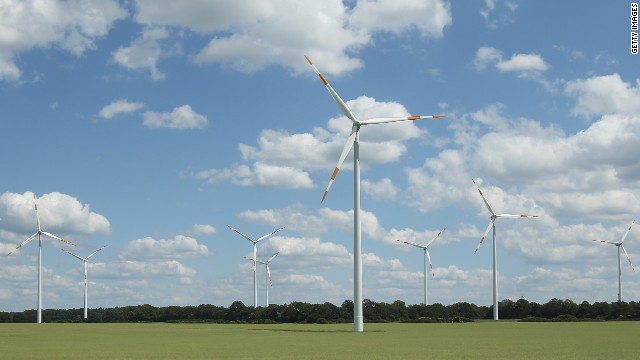
- A Chinese-owned wind farm company plans to sue President Barack Obama
- Firm blocked from building wind farms near a US navy test site in Oregon
(Financial Times) -- A Chinese-owned company that has been blocked from building wind farms near a US navy test site in Oregon plans to sue President Barack Obama, arguing that his order to stop the project was unconstitutional.
Ralls, a company owned by two Chinese executives, believes the president violated constitutional protections on property ownership and legal process.
The company is seeking to have the order overturned, or be paid compensation for its losses.
A person familiar with the case said: "The president is not above the law, even if national security is involved."
The case is the latest sign of tension over US openness to Chinese investment, which has been called into question after election campaign rhetoric from Mr Obama and Mitt Romney, his Republican challenger, about standing up to China over trade.
No one has ever before sued the US president over this type of ruling, but Ralls argues that Mr Obama exceeded his powers when he blocked the project and without giving a detailed justification.
On Friday afternoon, Mr Obama issued an order compelling the company to sell within 90 days four wind farm sites in Oregon, and to clear all its equipment and structures off the sites within 14 days.
He also asserted the right to interview Ralls' employees and advisers and to inspect its documents and computer records in the US, to ensure that the order had been carried out in full.
The statement said: "There is credible evidence that [Ralls] . . . might take action that threatens to impair the national security of the United States," but gave no further details.
The ruling followed earlier orders from the Committee on Foreign Investment in the US, an interdepartmental body chaired by Tim Geithner, the Treasury secretary, telling Ralls to stop work on the project, and preventing it from selling the sites without US government approval.
Ralls had challenged those Cfius decisions in court, prompting the president to make an order blocking an investment for the first time since 1990.
Ralls is advised by two high-profile lawyers: Viet Dinh and Paul Clement of Bancroft, respectively assistant attorney-general and solicitor-general in the administration of former president George W. Bush.
Lawyers not involved in the case said Ralls would face an uphill battle to win its case against Mr Obama, with courts generally reluctant to challenge presidential decisions relating to national security.
Stephen Mahinka of Morgan Lewis & Bockius in Washington said the case reflected the problems caused by the opacity of the Cfius process. "From the US point of view of attracting foreign direct investment, it is counterproductive to be so non-transparent," he said.
Dawei Duan and Jialing Wu, the two owners of Ralls, are executives of Sany, the Chinese construction equipment company that is moving into the wind power business, and they had planned to use Sany turbines for the Oregon project.
The four sites, acquired by Ralls earlier in the year, are inside or within five miles of airspace used by the US navy to test drones and train for electronic warfare.
Ralls argues that there are "scores" of other wind turbines already operating in the area.
It said: "The selective and arbitrary singling out of Ralls' project drives our effort to seek redress in US courts . . . We are confident that the courts will vindicate Ralls's rights under the law and the constitution and we intend to pursue the remedies that the law makes available."
However, Natalie Wyeth Earnest, a spokeswoman for the Treasury department, said: "They could try to pursue a lawsuit, but the Cfius statute clearly states that the president's actions are not subject to judicial review."
The company is facing losses on the investment it has made in the project, and on the production tax credit for wind power, potentially worth $25m, which is scheduled to expire and will be available only to projects supplying power to the grid by the end of the year.
The Ralls dispute comes as Cfius is reviewing two other potentially sensitive transactions involving Chinese companies: Cnooc's $15bn acquisition of Nexen of Canada, which has oil and gas assets in the US, and the investment by Wanxiang in Massachusetts-based A123, an advanced battery manufacturer that has benefited from support from the US government.
No comments:
Post a Comment